The Love of Jeanne Ney (1927)
Directed by: Georg Wilhelm Pabst
Written by: Ilja Ehrenburg, Ladislaus Vajda, Rudolf Leonhardt
Starring: Brigitte Helm, Édith Jéhanne, Fritz Rasp, Uno Henning
AKA DIE LIEBE DER JEANNE NEY
GERMANY
AVAILABLE ON BLU-RAY: NOW, from EUREKA ENTERTAINMENT
RUNNING TIME: 106 mins
REVIEWED BY: Dr Lenera
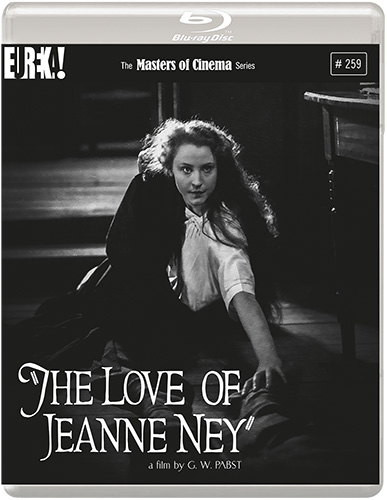
In the Crimea during the Civil War, neutral French businessman Andre Ney is doing spy work for the White Russians, who are losing. His daughter Jeanne is in love with the Russian Andreas Labov, not knowing that he’s a Bolshevik agent. The scheming scoundrel Khalibiev needs money and sells Andre a list of Bolshevik agents that includes Andreas. When Andreas and another communist go to Andre and demand the list, Andre tries to shoot them and his companion kills him. Jeanne flees to Paris just as the revolutionary army is about to storm the city and gets a job as a secretary under her uncle Raymond, a private detective who lives with his blind daughter Gabrielle. His assistant Gaston has just retrieved a stolen diamond. Andreas then shows up again, assigned to Paris to deliver money to fund a Communist labor campaign in Toulon, but so does Khalibiev who has some really nasty plans for the Neys….
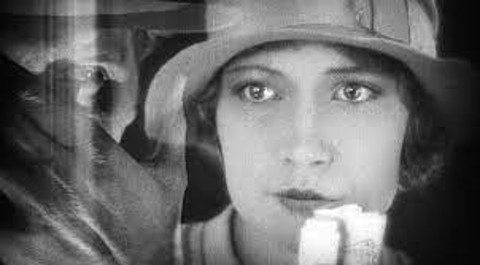
The Love Of Jeanne Ney, based on a book by Ilja Ehrenburg, is in some ways one of those films that shouldn’t really work well, even if you’re used to offerings from its period which, except for many of the comedies, are probably quite difficult for many modern viewers to get into without some prior experience. And I say that with no insult meant for either silent movies or people today. This work from the director of the much admired, indeed iconic, Pandora’s Box, and Diary Of A Lost Girl, ought to be a goofy, incoherent mess. In fact, maybe it is if you look at it from a certain angle. Its visual style seems to mix elements of several silent film movements without much rhyme or reason, while its plot – god lord, it’s plot – is crammed full of silly coincidences and throughout requires that characters never ask the right questions of each other. People enter then randomly exit the narrative and the ending leaves several threads hanging. The event-filled plot sometimes moves so fast that it’s hard to process everything that’s happened, yet is willing to slow down for a lengthy scene of our hero and heroine wandering around a market, simply to show off Georg Wilhelm Pabst and cinematographers Robert Lach and Fritz Arno Wagner’s mastery of tracking shots. The acting has some performers act naturalistically and others behave in such a mannered fashion it must have seemed absurd even back in 1927. For goodness sake, the villain actually twirls his moustache and smells VILLAIN so much it’s a wonder anyone trusts him. But here’s the thing; to me, it feels as if Pabst and his writers Rudolf Leonhardt and Ladislaus Vajda probably realised that the silent era was soon to end and that films would change, and therefore decided to go all absurd and over the top, to have lots of fun incorporating tried and tested elements while Pabst, Lach and Wagner could also show off the technical mastery they’d learnt.
It’s bizarre that a film like this has so little production information about it, though I’m sure the featurette on Eureka’s Blu-ray will provide some. So let’s delve into the review proper and describe the opening scene which begins with showing us some booted feet before we track along to a very messy table where we see a hand fumbling for a match. The man is actually our villain Khalibiev, and as well as smoking from a pipe with a nude female figure on it, he seems too wasted to join in the hijinks which are taking place next door, though he does then start writing down a list, the first time of many where the story will let us know what’s going on before most of the characters do. This lessens surprise, though there’s one very unusual moment where this is amusingly subverted later. Said hijinks are loads of Soviet officers cavorting with loose women amidst loads of booze, while the camera goes surprisingly wild for the time, panning almost crazily over the action. The sole person in the room not joining is Andreas, who’s probably thinking of his girlfriend Jeanne. She’s certainly thinking of him when a gaze through a window transitions to when the couple were at the forefront of the Russian Revolution, with archetypal images of rebels and flags with Andreas being up one. A rapid zoom out from the couple on some steps reveals several other couples together, before we transition to an idyllic forest where Jeanne runs to find and kiss Andreas behind a tree. Phew! The early scenes really do throw a lot at you!
Back in the present day in the Crimea, the scheming of Khalibiev has him sell Andre a list of Bolshevik agents that include Andreas. The information is leaked by Alfred’s Chinese servant, though Khalibiev isn’t implicated. Andreas and another communist go to Andre and demanding the list results in Andreas’ colleague shoots him dead and Andreas has blood on his head, and we get a really powerful moment, one of several where action seems to be slowed down, as Jeanne sees what has happened and is told by Andreas that he’s a communist. The two just stand there, trying to take everything in. However, Jeanne doesn’t seem angry enough and never seems to bare a grudge for the murder of her father. Huh? The revolutionary army take the city, seriously disturbing the orgy that’s still going on, and then shooting people with firing squads. Andreas warns Jeanne that it’s she who must run, as the Red Army will soon occupy the town. She escapes with the help of Commander Zacharkiewicz who’s smitten with her, but does not become a rapist unlike many men in silent films whose feelings for a woman aren’t returned. He’s a kindly sort, and even lets her see Andreas before he lets her go free to her native Paris, though he amusingly keeps him standing outside in the pouring rain before he tells Jeanne that he’s there. In Paris, Uncle Raymond doesn’t really want to take her in but daughter Gabrielle insists, even though it’s a distinctly shady outfit, with Detective Gaston not showing any sympathy whatsoever for the client he’s just shown evidence of his wife’s cheating and pressurising him to pay up. Then knowledge of a found diamond causes none other than Khalibiev to show up disguised as the owner and then think of several other, even more dastardly schemes.
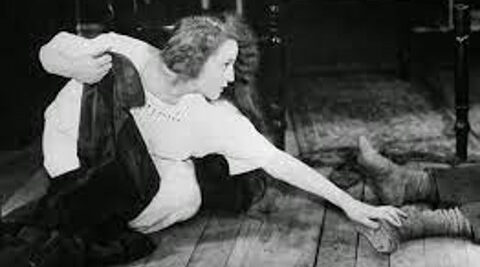
At one point Khalibiev decides to marry Gabrielle before killing her and taking her money. For some reason he tells this to another woman who, in a really surprising turn, promptly tells others about it, but they don’t believe him. The characters circle around each other while events happen in quick succession. Then we take a breather, and focus on romance for a bit, until we get a rather Alfred Hitchcock-style climax set on an outdoor train compartment where our heroine espies our villain and sits with him, the two people gradually pealing off each other’s layers in well escalating suspense while, in true Hitchcock style, humour is added by a kindly elderly couple who insist that the others enjoy some of their breakfast; of course Khalibeiv doesn’t just have a dash of the liquor that’s going on, he necks the bottle to the annoyance of the man who nonetheless is too polite to reproach him about it. Fritz Rasp, also a Metropolis player albeit one whose part was heavily cut down in all versions until the almost complete print was found, way overdoes the villainous mannerisms and seems determined to pull as many faces as possible, but he has an interesting face which you can’t take your eyes off, even when the luminous Edith Jehanne [Jeanne] is on screen. By contrast, some other players are pretty subtle, such as Sig Arno as Gaston. He has some great looks and is especially good where he attacks a parrot; some animal lovers [of which I’m one] may object to me saying this but I found it hilarious, and Gaston does have a good reason for doing this. It’s a bit frustrating when people are introduced to people who we think will serve an important function but are instead never seen again, and some subplots are unresolved. Was this film cut down like so many other silents?
Jeanne is lusted after by nearly every man in sight, though one can kind of understand this given how likeable, magnetic and pretty Edith Jehanne, not a name that was familiar to me before now. She seems more natural than the more glamorous likes of Greta Garbo and Gloria Swanson who examplified the type that was most popular at the time, which must be why she never really took off. She’s also a better actress, delivering a performance that would fit in a film made during today, though I can’t work out whether her Gene Tierney-like lip pursing is her trying not to show her teeth or just part of her performance. Unfortunately the expressionistic histrionics of Brigitte Helm, whose presence was the thing that got me most interested in watching this seeing as I’m a huge Metropolis lover, go way over the top in trying to portray blindness. Pabst clearly wasn’t bothered at the idiocy of Gabrielle groping around her house as if she’s never been there before and not looking towards people when they speak. Yet the dramatically different acting styles of the two achieve a weird sort of balance and both ladies feature in the film’s most perverse scene, where Khalibeiv sits between the two at dinner while uncle is dozing off. He tries to molest Jeanne while Gabrielle keeps holding his hand and has no idea what Khalibeiv is doing. Gabrielle’s outstretched arms as Khalibeiv gets up to follow Jeanne is one of two moments where Helm’s performing works. A contrast is the lovely scene where Andreas suggests to Jeanne that, as he has nowhere else to go, he stays at the hotel right beside them. The camera pans all over the front of the place including its four signs before cutting to Jeanne with a knowing look on her face. Jehanne is so good that that’s all we need. We can tell that she knows what he’s really asking and that she want it too.
Unusual angles, clever montage and a very mobile camera enhance, rather than drown, the seemingly chaotic melding of political thriller, romantic melodrama, murder thriller and even horror movie; the scene where Uncle is going a bit mad on his own and imagines all this money that he counts has a very dark feel, as does the one where Khalibeiv has just committed murder and Gabrielle comes home, the second scene where Helm’s stylised emoting works for rather than against the proceedings. In scenes like this, the photographic style evokes the distorted sets and shadows of German Expressionism, while elsewhere the Russian montage style is taken to extremes. Often we’re flashed an image representing what somebody’s thinking. Many of the elaborate shots, such as a high angle shot of our lovers on a hill while we can just spot some ant-like people below, serve an emotional or symbolic function, even though one can still definitely say that “excess” is the best word to describe Pabst’s film. I found The Love Of Jeanne Ney to be wildly entertaining. I reckon you will too as long as you’ve seen a few other silent films first. Well, actually, maybe even if you haven’t.
Rating: 









SPECIAL FEATURES
1080p presentation on Blu-ray, fully restored with a score by Bernd Thewes
This is probably a port of the Kino Classics restoration with a new encode. As is often the case, the majority of the film looks as great as can be expected, with good clarity and depth, but some shots and scenes look rough because the main print used was incomplete and they had to taken from other sources. The Bernd Thewes score is probably adapted from the original one by Hans May. It has many distinct themes and motifs as a Tchaikovsky/Shostakovich vibe in the Crimea scenes gives way to a more modern sensibility with beats, lighter melodies and a rather intrusive synthesised organ. You can’t really say, though, that the many really loud and over the top portions of the score aren’t suited to the proceedings!
Optional English subtitles
Opening text tells us that for years the original German intertitles were replaced by English-language ones on the version that was most widely seen. Here the German ones have been restored and subtitles. There aren’t that many of them, and that’s fine; the visual storytelling is so strong.
Alternate US release version with music by Andrew Earle Simpson [86 mins]
I just browsed through this. It removes a few scenes which don’t advance the plot including two I mentioned above. This tightens the pace but lessens some of the flavour. Some characters are renamed and there are more intertitles; the original version assumed that viewers would be intelligent enough to pick up on most of what was happening without text describing it.
Too Romantic, Too Ghastly – Brand New video essay by David Cairns and Fiona Watson [25 mins]
The Kino had an audio commentary; I always look forward to Cairns and Watson’s pieces so this featurette seems like a fair substitute. While 25 mins doesn’t sound that long, there’s a lot of interest here; quotes from Louise Brooks about working with Pabst [rather than gathering cast members together to talk to them about a scene, he would speak to them individually], Pabst being one director who stayed in Germany when the Nazis took over and made propaganda films which tarnished his reputation for many years, comparisons with the book which had a far less happy ending. Cairns thinks that Helm is “magnificent” but isn’t too taken with Jehanne’s performance, while Pabst can be defined by “political incoherence” and “leering, fetishistic social observation”, neither of which description is an insult.
A collector’s booklet featuring new writing on the film by Philip Kemp
Crazy plotting and striking film making make for a highly entertaining and edifying mix. Highly Recommended.


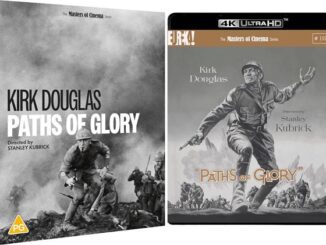
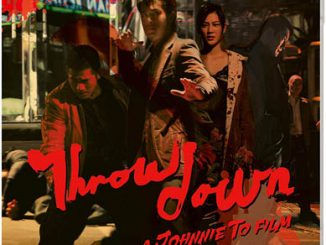
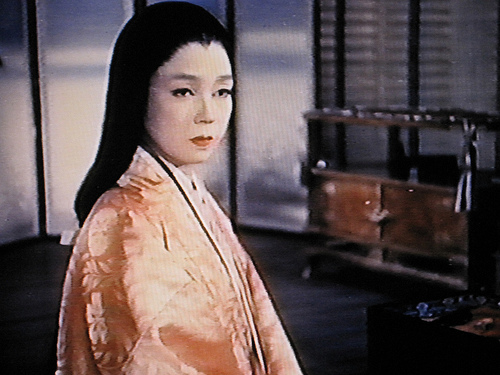
Be the first to comment